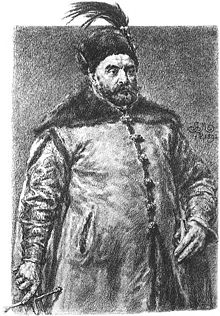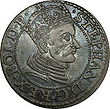Stephen Báthory
- For ships named after this king, see MS Batory or the later TSS Stefan Batory.
| Stephen Báthory | |
|---|---|
 | |
| King of Poland | |
| Reign | May 1, 1576 - December 12, 1586 |
| Election Coronation | December 14, 1575 May 1, 1576 |
| Predecessor | Anna Jagiellon |
| Successor | Sigismund III Vasa |
| Burial | Wawel Cathedral, Saint Mary's Crypt (buried May 1588) |
| Spouse | Anna Jagiellon |
| House | Bathory |
| Father | Stephen Báthory of Somlyo |
| Mother | Catherine Telegdi |
| Signature | |

Stephen Báthory (Polish: Stefan Batory, Hungarian: Báthory István, Lithuanian: Steponas Batoras, Portuguese: Estêvão Bathory, Romanian: Ştefan Báthory, Russian: Стефан Баторий) (27 September 1533 – 12 December 1586) was a Hungarian noble Prince of Transylvania (1571-1586), then King of Poland (1576-1586) and Grand Duke of Lithuania (1576-1586). He was a member of the Somlyo branch of the noble Hungarian Báthory family. Many historians consider him to be one of the greatest of the elected Kings of Poland.
Biography

Stephen Báthory was born in Somlyo as the son of Stephen Báthory (d. 1534). His father was a partisan of John Zapolya, who claimed the crown of Hungary in opposition to the Habsburg claimant Ferdinand I, and had been appointed Voivode of Transylvania.
Stephen Báthory became known as a skillful diplomat. His advocacy for the rights of Zapolya's son John Sigismund incurred the animosity of the Emperor Maximilian II, who kept him in prison for two years.
The Habsburgs and Zapolya courts finally reached an agreement in 1570 and John Sigismund contented himself with Transylvania. After his death in 1571, the Transylvanian estates elected Stephen Báthory Voivod of Transylvania — against the provisions of the late Prince, who had appointed Gáspár Bekes his successor. Supported by the Habsburgs, Bekesy insisted on his claims but in a civil war Báthory ultimately drove his rival out of the country.
In 1572, the throne of the Polish-Lithuanian Commonwealth, at the time the largest and one of the most populous states in Europe, was vacated when King Sigismund II of Poland died without heirs. In April 1573, his sister Anna, the sole heir to the crown, convinced the Sejm to elect the French prince Henry of Valois as ruler. A marriage with Henry was to further legitimize Henry's rule but less than a year after his coronation, Henry fled Poland to succeed his brother as King of France.
On December 12, 1575, after a interregnum of roughly one and a half years, the Sejm, persuaded by the Papal nuncio, elected the Emperor Maximilian as the new monarch. However, after three days the nobility threatened the senate with civil war and demanded a Piast king, a Polish King. After a heated discussion, it was decided that Anna should be elected King of Poland and marry Stephen Báthory. Representatives of Lithuania left the Sejm and did not participate in this election. Among the strongest supporters of his candidacy were the Protestants and Socinians, who feared a Habsburg ruler could introduce Counter-Reformation in Poland, whereas Stephen's Transylvania was known for freedom of religion.

On December 13, 1575 Anna Jagiellon was elected in Warsaw King of Poland and Grand Duke of Lithuania and on May 1, 1576 Stephen married Anna and was crowned King of Poland and Grand Duke of Lithuania.
Grand Duke of Lithuania
This coronation almost made the Union of Lublin obsolete, as the representatives of the Grand Duchy of Lithuania who were not present at this election seriously considered electing Emperor Maximilian. After some negotiations and assurance of Lithuania's full federal rights within the Commonwealth, Stephen Báthory was recognized as Grand Duke of Lithuania, Duke of Ruthenia and Samogitia.[1]. As a token of his recognition he established Almae Academia et Universitas Vilnensis Societatis Jesu.
Establishing power
Stephen Báthory's position was at first extremely difficult. The country was badly damaged by the troubles of the interregnum. Emperor Maximilian, insisting on his earlier election, fostered internal opposition and in league with Tsardom of Russia prepared to enforce his claim by military action. However, Maximilian's sudden death completely reversed the situation.
All armed opposition collapsed when the prolonged Siege of Danzig (1577) by Batory's forces was lifted as an agreement was reached. The Hanseatic League city, bolstered by its immense wealth, fortifications, and the secret support of Denmark and Emperor Maximilian, had supported the latter's election and decided not to recognize Stephen. After a siege of six months, the Danzig army of 5,000 mercenaries was utterly defeated in a field battle on December 16, 1577. However, since Stephen's armies were unable to take the city by force, a compromise was reached: Stephen Báthory confirmed the city's special status and her Danzig law privileges granted by earlier Polish kings. The city recognised him as ruler of Poland and paid the enormous sum of 200,000 guldens in gold as payoff ("apology"). Danzig later remained loyal to the Kingdom during wars with Sweden and Tsardom of Russia, providing help when requested.

This victory gave Stephen a chance to devote himself to strengthening royal authority, in which he was supported by his chancellor Jan Zamoyski, who was just as skilled a politician. The two managed to win over several factions of the Lithuanian and Polish nobility, mostly by means of better taxation of crown lands and royal property leased to the nobility. Stephen completely reorganized the Polish Army. Among his genuine inventions was the piechota wybraniecka semi-professional infantry formation, composed of peasants trained in both infantry warfare and engineering. Stephen also reorganised the judiciary by formation of legal tribunals. He also founded the Academy of Vilna, the third university in the Commonwealth and a predecessor of the modern Vilnius University. Stephen also ordered the execution of Samuel Zborowski, whose death sentence for treason and murder had been pending for roughly a decade.
In external relations, Stephen sought peace through strong alliances. Though Stephen remained distrustful of the Habsburgs, he entered into a defensive alliance with Maximilian's successor, Rudolf II, fostered by the papal nuncio. The difficulties with the Ottoman Empire were temporarily adjusted by a truce signed on November 5, 1577. The Sejm gathered in Warsaw was persuaded to grant Stephen subsidies for the inevitable war against Muscovy. Two campaigns in which Báthory, although hampered by the Sejm, were successful. Báthory's diplomatic skills in the meantime ensured that there was no conflict with the Ottomans, nor with the emperor.

Stephen, together with his chancellor Zamoyski, led the army of the Commonwealth in a decisive campaign during the Livonian War (which involved the Tsardom of Russia, Sweden, the Kingdom of Livonia, Denmark-Norway and the Tsardom of Russia and formed part of the Muscovite wars between Poland-Lithuania and Muscovy). Ivan the Terrible had invaded Livonia and took Dorpat, Duchy of Courland, which a few years earlier had become a vassal of the Commonwealth. The Commonwealth army routed the Russian force at Velikiye Luki. In 1581 Stephen penetrated into Russia and, on August 22, laid siege to the city of Pskov, whose vast size and imposing fortifications filled the little Commonwealth army with dismay. But Báthory, despite the objections of some of his officers, and critique from the papal nuncio Possevino, send by the curia to mediate between the Muscovites and the Commonwealth, decided to keep up the siege. Finally, on the December 13, 1581, Ivan the Terrible, alarmed for the safety of the third city in his empire, concluded the Peace of Jam Zapolski (January 15, 1582), thereby ceding Polatsk and the Duchy of Livonia back to the Commonwealth, where Báthory revoked the noble privileges granted in the Treaty of Vilnius (1561) and initiated counter-reformation.
With the eastern borders secure, Stephen planned a Christian alliance with Tsardom of Russia against the Ottoman Empire. However, Russia's lapse into the Time of Troubles left him without a Russian partner, while the proposal of a personal union with Muscovy was rendered moot by his own sudden death, on December 12, 1586 in Old Hrodna Castle. (His autopsy there was the first to take place in Eastern Europe; Báthory was originally interred also in Hrodna.)
His death was followed by an interregnum of one year. The Emperor's brother Archduke Maximilian, was elected King but was contested by the Swedish Sigismund III Vasa, who defeated Maximilian at the Byczyna and succeeded as ruler of the Commonwealth. According to contemporary panegyrics Stephen Báthory's deeds surpassed previous monarchs and can be compared only to Vytautas.[2]
Ancestors
| István Báthory of Somlyó | |||||||||||||||
| Nicholas Báthory | |||||||||||||||
| Dorottya Várdai | |||||||||||||||
| Stephen VIII Báthory | |||||||||||||||
| Barbara Kázméri | |||||||||||||||
| Stephen Báthory | |||||||||||||||
| János Telegdi | |||||||||||||||
| Stephen Telegdi | |||||||||||||||
| Erzsébet Báthory of Ecsed | |||||||||||||||
| Catherine Telegdi | |||||||||||||||
| György Bebek of Pelsöcz | |||||||||||||||
| Margaret Bebek of Pelsöcz | |||||||||||||||
| Fruzsina Hederváry[3] | |||||||||||||||
Gallery
-
Portrait by the court painter Marcin Kober with the king wearing a jewelled hat-pin in his Hungarian-style felt cap.
-
Grand Courtyard of Vilnius University (established by the king in 1579).
Notes
- ^ His official titles were Stephanus Dei gratia rex Poloniae et magnus dux Lithuaniae, Russiae, Prussiae, Masoviae, Samogitiae, Kiioviae, Voliniae, Podlachiae, Livoniaeque, necnon. princeps Transylvaniae. in Latin.
- ^ Mickūnaitė, Giedrė (2006). Making a great ruler: Grand Duke Vytautas of Lithuania. Budapest: Central European University press. p. 156. ISBN 9637326588.
{{cite book}}: Cite has empty unknown parameter:|coauthors=(help) - ^ www.rootsweb.com
- ^ Wiktor Kakareko, Muzeum Panstwowe w Grodnie i jego straty w okresie II wojny swiatowej (State Museum in Hrodna and its losses during the World War II) [1].
See also
References
- This article incorporates text from a publication now in the public domain: Chisholm, Hugh, ed. (1911). Encyclopædia Britannica (11th ed.). Cambridge University Press.
{{cite encyclopedia}}: Missing or empty|title=(help)
External links
- Template:Pl icon Stephen Báthory's szkofia in the National Museum in Kraków [2].
- Roman Catholic monarchs
- Báthory family
- Polish monarchs
- Grand Dukes of Lithuania
- Jure uxoris kings
- 1533 births
- 1586 deaths
- People from Şimleu Silvaniei
- Hungarian nobility
- 16th-century Hungarian people
- Polish people of the Polish–Russian War (1577–1582)
- Burials at Archcathedral Basilica of Sts. Stanisław and Vaclav, Kraków



